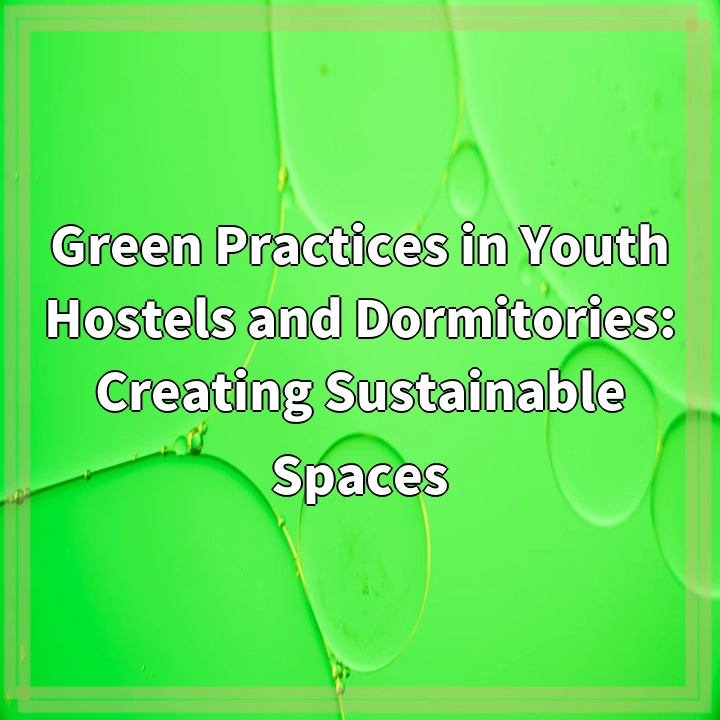
What it is:
Green Practices in Youth Hostels and Dormitories: Creating Sustainable Spaces
Youth hostels and dormitories, especially popular among students and young travelers, are ideal spaces to implement green practices. Creating sustainable spaces within these accommodations involves adopting various environmentally friendly measures to minimize negative impacts on the environment. From energy-saving techniques to waste reduction strategies, green practices in youth hostels and dormitories aim to promote sustainability and educate guests on responsible living.
Real-world problems:
1. Energy consumption:
The high volume of guests in youth hostels and dormitories can lead to excessive energy consumption. With multiple individuals sharing spaces, energy-intensive activities such as heating, cooling, and lighting can quickly add up. Inefficient energy use not only results in increased utility bills but also contributes to greenhouse gas emissions and environmental degradation.
2. Waste generation:
The bustling nature of youth hostels and dormitories often leads to significant waste generation. From single-use plastics to excess food waste, the accumulation of non-recyclable and non-biodegradable materials puts a strain on local waste management systems. Additionally, improper waste disposal practices can harm nearby ecosystems and wildlife.
3. Water conservation:
Water usage is another significant concern in youth hostels and dormitories. Large numbers of guests utilizing showers, sinks, toilets, and laundry facilities can result in excessive water consumption. The need to maintain cleanliness and hygiene must be balanced with water conservation efforts to ensure responsible use and minimize water scarcity issues.
4. Lack of awareness and education:
One of the pressing challenges faced by youth hostels and dormitories is the lack of awareness and education among guests regarding sustainable practices. Many individuals may not realize the environmental impact of their actions or may be unaware of alternative, eco-friendly options. Without proper information and education, it is difficult to foster a culture of sustainability and encourage guests to make conscious choices that reduce their ecological footprint.

Solutions for creating sustainable spaces in youth hostels and dormitories:
Implementing green practices in youth hostels and dormitories can help address the environmental problems discussed above. By taking proactive measures, these accommodation establishments can reduce their ecological footprint and inspire guests to adopt sustainable habits.
1. Energy-saving initiatives:
Installing energy-efficient appliances, LED lighting systems, and motion sensors can significantly reduce energy consumption in youth hostels and dormitories. Encouraging guests to turn off lights and unplug devices when not in use, as well as providing education on energy-saving habits, can further contribute to energy conservation.
2. Waste reduction and recycling programs:
Implementing comprehensive waste management systems that prioritize recycling and composting can help minimize the amount of waste generated by youth hostels and dormitories. Providing clearly labeled recycling bins and composting facilities, as well as educating guests on proper waste segregation, can promote responsible waste disposal practices.
3. Water-efficient measures:
Installing water-saving devices, such as low-flow showerheads and faucets, can reduce water consumption without sacrificing comfort. Youth hostels and dormitories can also promote water conservation by encouraging guests to adopt shorter shower times and reuse towels and linens when possible.
4. Education and awareness campaigns:
By integrating sustainability education into the guest experience, youth hostels and dormitories can raise awareness about environmental issues and inspire guests to make environmentally conscious choices. This can include providing information on local environmental initiatives, organizing workshops or presentations on sustainable practices, and showcasing success stories of sustainable living.
By implementing these solutions and continuously striving to improve, youth hostels and dormitories can become beacons of sustainability, providing a positive example for guests and the wider community.















